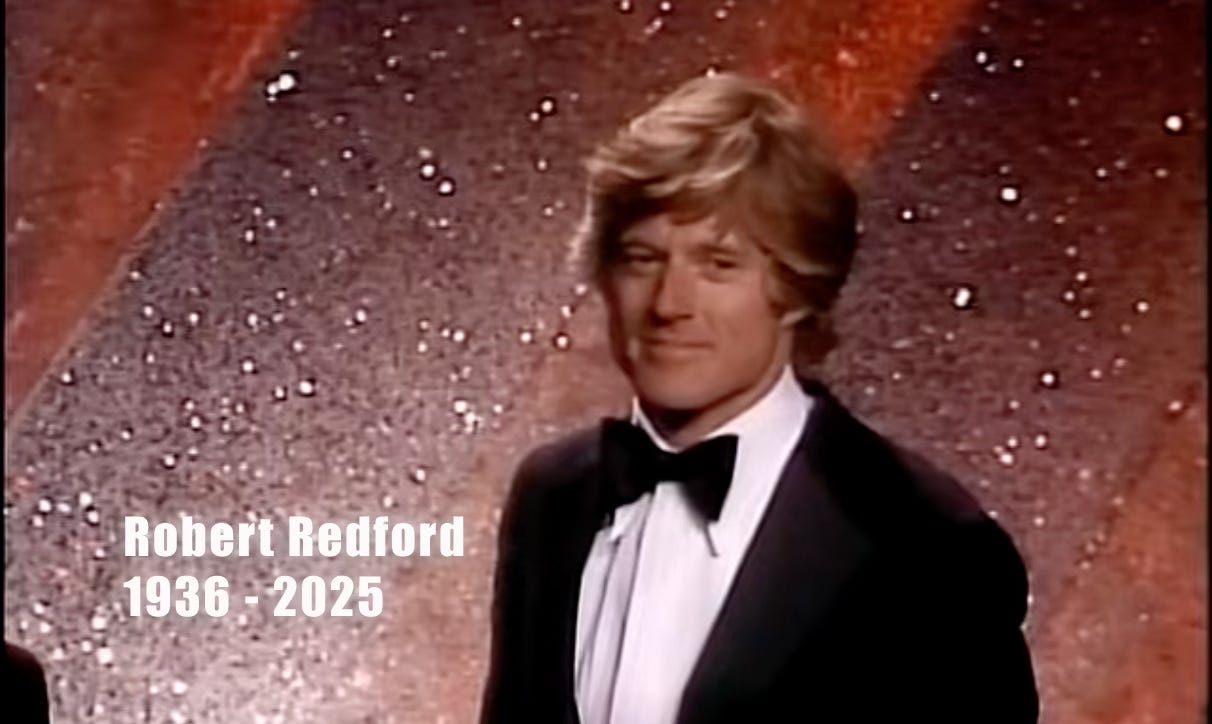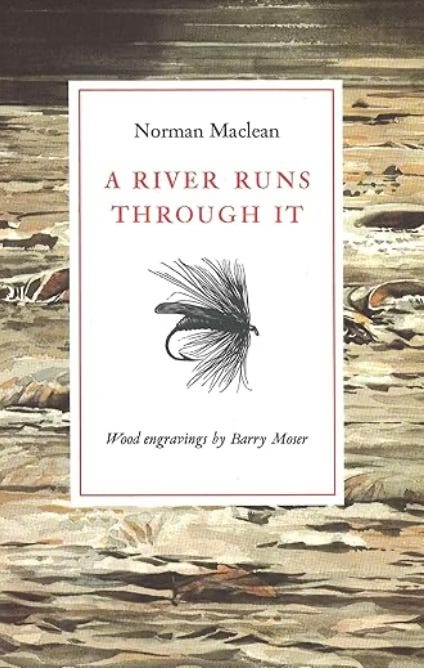Robert Redford Takes the Best of Hollywood With Him
1936-2025
Robert Redford has died at the age of 89. He was a lucky man who struck the genetic lottery with a thousand-watt smile. He wasn’t only the golden boy. He was more than that. He was the best Hollywood ever had to offer, and he takes it with him now that he’s gone.
Redford might have been famous in the Boomer era, but he was more of the hard-working, stoic of the Silent era. What drove him wasn’t so much to be rich or famous. He wanted to do good work and make great movies, and he made some of the best movies ever made.
He founded the Sundance Film Festival in Park City, Utah, which is now struggling to survive and can’t afford to stay in Utah, and will move to Boulder, Colorado, in 2027. The end of an era.
Redford was a man of integrity. He invested heavily in various charities - he was an old-school Democrat. The life he lived was far from Hollywood, and he rarely participated in how celebrity has changed over time. He didn’t virtue signal. He didn’t need attention after a time.
When I was covering the Oscars back in 2013, I was invited to the Patron’s Brunch in Telluride. This is a fancy occasion on the top of the mountain where the bloggers, critics, and sycophants are invited to mingle with the rich and famous. That year, Robert Redford was starring in a little-known film called All is Lost, where he spends the whole movie on a boat trying to survive alone. The title is the spoiler. You can imagine how it ends.
The idea that year was that Robert Redford would finally win an Oscar for Best Actor. He arrived with Frances Ford Coppola, and I began taking pictures because, are you kidding me? Coppola and Redford? The publicist pulled me back and said, “This is not that movie.” He was being protective of Redford because Redford was not into this kind of thing. I managed to take a few pictures anyway.




It looked as though Redford might get the nomination, and maybe even win. But he did something almost no one else in Hollywood has ever dared to do. He refused to campaign. Maybe that one appearance at the Patron’s brunch killed his appetite for it. Or maybe, as a “Silent era” type, he didn’t think it was honorable to “campaign” for an Oscar. Shouldn’t they just win on merit? Except that they don’t.
He skipped the entire “dog and pony” show, which meant ultimately he would not get the nomination. At the time, I remember thinking, How arrogant can a person possibly be? But now, looking back on it, I see why he didn’t participate. I will continue to tell this story so that people remember what integrity looks like. It isn’t always about winning if that win doesn’t feel deserved.
I remember Robert Redford more for the movies he made than the movies he starred in, though Butch Cassidy and the Sundance Kid, The Way We Were, and The Sting are all great movies. As a director, however, he directed ten films in all, but only three of them have stayed with me for decades.
Redford’s gift was in crafting cathartic endings that sent us out of the theater thinking about them, having been moved by them, and even changed by them. Here is the ending for Ordinary People from 1980:
He then adapted A River Runs Through It in 1992, which is the film version of Norman Maclean's famous memoir.
The ending of this film, spoken in Redford’s own voice, might be his own eulogy:
The ending of Quiz Show is memorable too, but not in the same way as Ordinary People or A River Runs Through It. It is not cathartic but ominous. It marked the era where everything began to change, where the Left planted the seeds that would ultimately lead to the Obama presidency and the utopia we built in his image.
The conclusion here about quiz shows is applied to politics, too. That was all of us waking up in the 1990s amid the therapy era, which Ordinary People helped launch. This depicts the cynicism of this age, or what they call in the Fourth Turning, the “unraveling.” It is cynical and hopeless, which helps explain why the Obama era became almost a religion, or at the very least, took the place of religion.
What I always loved about these three movies was how Redford worked out his own duality of being two people. He was the movie star, the golden boy, but he was also someone who saw himself fading into the background, the watcher, the introvert.
In Ordinary People, the Golden Boy dies, and the mother can’t bear to live without him, with only the one who didn’t shine surviving. Bucky was reckless, a hero no one would have ever expected wouldn’t survive the storm.
In Quiz Show, there is the duality of the Golden Boy, played by Ralph Fiennes, who becomes the television star that the producers discover draws better ratings than the character played by John Turturro. The duality is extended even further with the Rob Morrow character being drawn in and seduced by the Golden Boy.
In A River Runs Through It, Brad Pitt moves too fast through life, gliding on his good looks. His recklessness made him take risks and chase adventure that would eventually take his life. These bright lights that were snuffed out too soon hold a special place in our hearts, not unlike Charlie Kirk.
And now you see why movies used to matter, why they helped us through in times of darkness. They spoke to all of us by telling universal stories with universal themes. Living through a public assassination would ordinarily be something we could see worked out in art. We know that isn’t what we’ll see, not from them.
Hollywood no longer makes movies like these. The best of what they ever did will die with Robert Redford. What they make now are endless apologies and virtue signals at best, and agonizing lectures at worst.
The best of Hollywood was movie stars like Robert Redford and introspective watchers of behavior, also like Robert Redford.
Rest in peace.





A beautiful tribute to an outstanding talent. His films resonate in a way few do. Don't forget Horse Whisperer in your list of his films. Definitely a favorite.
What a thoughtful piece. This was very interesting to read. I think you’ve pinpointed the reason why so many Hollywood movies today seem so empty, with no message, no real point or concept to relay. It’s all about “special effects” and quick action, violence, always trying to hold the viewer’s attention…I think movies should engage you with its content and force you to think of concepts and to “feel”. This is why some movies are timeless. Thanks for sharing your post.